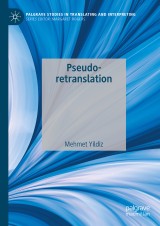Details

Pseudo-retranslation
Palgrave Studies in Translating and Interpreting
|
CHF 47.50 |
|
| Verlag: | Palgrave Macmillan |
| Format: | |
| Veröffentl.: | 16.08.2024 |
| ISBN/EAN: | 9783031645143 |
| Sprache: | englisch |
| Anzahl Seiten: | 144 |
Dieses eBook enthält ein Wasserzeichen.
Beschreibungen
<p>This book presents pseudo-retranslations as a new phenomenon of translational intertextuality, revealing how pseudo-retranslations establish large networks of intertextuality across academic works, how academic authors have recourse to this procedure as they create their academic texts, and how pseudo-retranslations contribute to the dissemination of translation-distorted scholarly knowledge and lead to epistemically polluted academic ecosystems. Pseudo-retranslation can be defined as an academic author’s partial or complete exploitation of another academic author’s translation and presenting it as a retranslation of the source text. This phenomenon, first documented in Yildiz (2021), arises from academic authors’ failure to refer to or translate primary sources – particularly in English. Since there occurs no actual retranslation process, this procedure is called pseudo-retranslation. Using a range of academic texts from the Turkish context as case studies, the author presents the integral constituents of this phenomenon, and the behavioural patterns of its renderers. This book will be of particular interest to academics and postgraduates in the field of translation studies and (corpus) linguistics.</p>
<p>Chapter 1: Introduction.- Chapter 2: Academic Texts and Intertextuality.-Chapter 3: Need for A New Conceptualisation: Why Pseudo-Retranslation?.- Chapter 4: Pseudo-Retranslation: A New Phenomenon of Translational Intertextuality.- Chapter 5: Methodology.- Chapter 6: Case-based Results.- Chapter 7: Conclusion.</p>
<p><strong>Mehmet Yildiz</strong> is an Associate Professor of Translation Studies in the Department of English Language and Literature at Canakkale Onsekiz Mart University, Türkiye.</p>
<p>This book presents pseudo-retranslations as a new phenomenon of translational intertextuality, revealing how pseudo-retranslations establish large networks of intertextuality across academic works, how academic authors have recourse to this procedure as they create their academic texts, and how pseudo-retranslations contribute to the dissemination of translation-distorted scholarly knowledge and lead to epistemically polluted academic ecosystems. Pseudo-retranslation can be defined as an academic author’s partial or complete exploitation of another academic author’s translation and presenting it as a retranslation of the source text. This phenomenon, first documented in Yildiz (2021), arises from academic authors’ failure to refer to or translate primary sources – particularly in English. Since there occurs no actual retranslation process, this procedure is called pseudo-retranslation. Using a range of academic texts from the Turkish context as case studies, the author presents the integral constituents of this phenomenon, and the behavioural patterns of its renderers. This book will be of particular interest to academics and postgraduates in the field of translation studies and (corpus) linguistics. </p>
<p><strong>Mehmet Yildiz</strong> is an Associate Professor of Translation Studies in the Department of English Language and Literature at Canakkale Onsekiz Mart University, Türkiye.</p>
<p><strong>Mehmet Yildiz</strong> is an Associate Professor of Translation Studies in the Department of English Language and Literature at Canakkale Onsekiz Mart University, Türkiye.</p>
Identifies and characterises a new translational phenomenon observable in academic works Offers a new theoretical framework that will allow researchers to problematise intertranslational appropriations Incorporates a corpus research methodology by using R
Diese Produkte könnten Sie auch interessieren:

Language Policy and Modernity in Southeast Asia

von: Antonio L. Rappa, Lionel Wee Hock An

CHF 118.00















